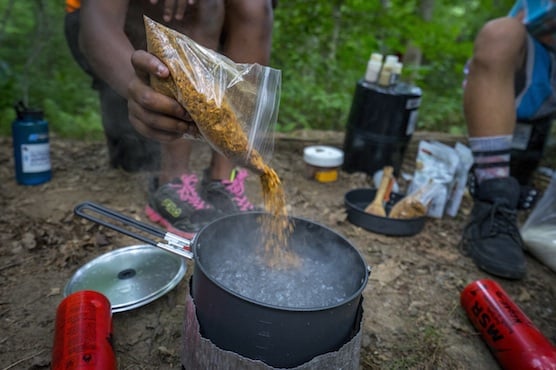It’s the end of a long day trekking through the backcountry. Tents are being set up, water is being collected and brought to the campsite and everyone is tired and hungry.
A conversation ensues:
Student: The stove won’t light.
Instructor: Okay.
Student: Should we fix it?
Instructor: Do you need it to cook dinner?
Student: Yes….we should fix it.
At this point the expedition, the cooks begin to “field strip” the stove. They remove all the parts, grease the gaskets, clean off the dirt and grime, then check the pump and screens and look for impurities in the fuel. After cleaning up all the parts, they reassemble the stove, pump it, light it up, lean down and listen closely.

Aha! There it is. The jet sound that is the sign of a happy working stove! Smiles are exchanged among the fledgling backcountry cooks because they know they prevented a potential disappointing dinner experience.
Every new generation of leaders needs to acquire the skills necessary for problem solving and they need to practice those skills. They must develop a healthy curiosity and take some risks. However, many of today’s students aren’t being given the opportunities they so desperately need to connect real life problems and decision making to everyday events. Practice and reality rarely meet.
On television, viewers are entertained by CEO’s, celebrity chefs and other professionals who react to problems by throwing things, delivering insulting remarks to their students and acting like spoiled children. Such behaviors won’t solve pressing problems, don’t result in a learning experience, and will most likely leave the learner with insignificant life and job skills.
Here at The National Center for Outdoor & Adventure Education (NCOAE), we teach people how to navigate real and perceived difficulties and solve real-world problems. Along the way, our students and course participants develop environmental and community stewardship, natural curiosity and informed perseverance. And we do it in a calm, soothing manner that encourages listening and learning. That means failures become learning opportunities for successes. Our students trust the instructor for guidance — but more important — they begin to trust themselves and each other. Students develop the abilities to become the innovators and experts.
Back to our story…
After the campsite dinner was completed and the Banks Fry-Bake pans and utensils were washed and stowed, one of the students asked the instructor, “Would we have gone home if we didn’t get the stove working?”
Before the instructor could answer, another student spoke up.
“We wouldn’t have gone home. We would have figured out another way to cook until we could fix the stove.”
A third student piped up.
“I know why you asked us questions rather than helping. You wanted us to figure it out, and you knew we could.”
This is a deeply satisfying response. We aren’t trying to hide the fact that we want our course participants to succeed. For a student to verbalize this means they are well on the way to transformation.
In this particular tale, NCOAE course participants took ownership of the expedition by being proactive and informed. When our participants return from wilderness courses, we often notice that teachers, parents, bosses and community members witness a noticeable shift in behaviors in these students.
As our season swings into high gear, we are preparing to set our participants up for success by allowing them to face problems and experience calculated stresses and failures — especially those which afford them the opportunity to return from the backcountry as designers, problem solvers, team players and leaders.
Like Charles Bukowski, the American poet, novelist and short story writer once wrote:
“Things get bad for all of us — almost continually — and what we do under the constant stress reveals who and what we are. What matters most is how well you walk through the fire.”
– – – – – – –
About the Author: Stephen Mullaney is the staff development director at The National Center for Outdoor & Adventure Education (NCOAE) in Wilmington, N.C., where he is responsible for the training and education of NCOAE’s field instructors. He is a member of the North Carolina Association of Educators (NCAE) and has taught within the Durham, N.C., public school system. Stephen received his undergraduate degree in English from Framingham State University, and an independent, alternative Masters in Education.
TALK TO US
Have any further questions about our courses, what you’ll learn, or what else to expect? Contact us, we’re here to help!
Leave a comment